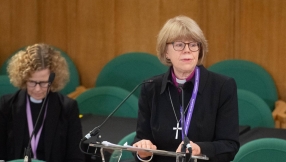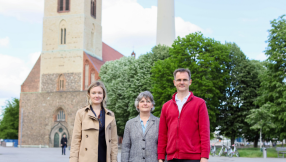
Bible Society released a report a few weeks ago entitled The Quiet Revival. The title was carefully chosen: when Christians, particularly in the Evangelical tradition, hear the word 'revival', they tend to think of emotionally charged services, dramatic numbers of conversions, packed congregations and nowhere to park. There are certainly churches where that is happening, but then that's always been true.
A different sort of revival
Our Quiet Revival – based on massive surveys conducted by YouGov, Britain's leading polling organisation – is a different sort of thing. There is a general upsurge of interest in Christianity and the Bible. There has been a very marked increase in the number of people in England and Wales saying they attend church compared with six years ago. More churchgoing Christians are reading the Bible.
Churchgoing, it turns out, is good for you: if you go to church you're less likely to say you feel anxious or depressed, more likely to feel close to your community, and more likely to volunteer and give to charity.
The facts and figures are all available on Bible Society's website, and there's a comprehensive FAQ section for those who want a deeper dive. But it's worth just stressing that this is good, robust data. Because it's counter-intuitive – after all, everyone knows the Church is in decline, don't they? – there's been some push-back from sceptics; some of them reasonably well-informed, some, shall we say, rather less so.
Countering the sceptics
Can we, for instance, be reasonably sure that church attendance has risen by around 50 per cent during the last six years? Well, no poll is infallible, obviously. But both this one and the previous one have been conducted to the highest standards of polling reliability. The methodology used in both cases was the same. The idea that YouGov's highly trained, professional analysts are incapable of devising an accurate survey is plain wrong. Furthermore, critics have to account for the difference between the 2018 and 2024 polls – if one was wrong, why not the other?
The differences between our figures for Catholic and Anglican attendance and their own (ours show more growth than theirs) are more interesting. Look at the methodology of the counting, though, and again it's perfectly possible to explain this. We're very confident in the accuracy of the survey.
Stories of growth
And while one anecdote is not really evidence, enough anecdotes can support evidence – and more and more people are saying, "This is exactly what we're seeing." Again and again we're hearing stories of people coming to faith and churches growing, in exciting and encouraging ways. It really does seem to be true that there has been a change in the spiritual climate.
Here's another thing though. The fact of a 'quiet revival' in itself is just ... interesting, and yes, encouraging. But it's what we do with this information that counts.
What about the Bible?
Two facts stand out. One is that churchgoers are reading the Bible more. In 2018, half of churchgoing Christians read the Bible weekly outside a Sunday service; now, it's two-thirds. Remarkably, the under-35s are the most likely to read the Bible at least weekly – and while one in four non-churchgoers would consider giving the Bible a try, that figure rises to 37 per cent of 18 to 24-year-olds. There is a genuine curiosity about the Bible and a desire to read it, particularly among younger people.
Second, though: we also found that around a third of churchgoers say they lack confidence in navigating or understanding the Bible. Among these curious and enthusiastic 18 to 34-year-olds, a third say their faith is undermined when they read some parts of the Bible. They're also more likely to say that their faith in the Bible is sometimes shaken by the media and British culture, and to say that finding appropriate resources and people to learn from is challenging.
Why the Bible matters
It won't surprise readers that Bible Society is convinced of the importance of the Bible. It is fundamental to our knowledge of God, to our Christian flourishing and to the spiritual health of God's Church. So we want to encourage particularly Christian leaders to take these opportunities and challenges around Bible reading seriously. There is an openness to Scripture, especially among younger people, that hasn't been seen for years. Are we ready to meet this with good resources, with minds and hearts prepared for potentially stretching conversations, and with a personal confidence that the Bible is trustworthy and true?
And the challenges – even if people are open to Scripture, they don't always understand it and parts of it worry them. How intentional are we about making the Bible central to our church life, encouraging people not just to read it but to hear God speaking to them through it, and letting it shape how we journey through the world?
Growing future-proof disciples
The Quiet Revival provided some eye-catching headlines because it showed that the Church is alive, well and growing. But this is the context for the Bible mission that can ground this revival in God's word, and help create disciples who are like "trees planted by streams of water" – confident Christians who live out their faith in their daily lives, able to understand and explain the Bible to others, and to pass on the faith that they've received. In our report we talk about the need to prioritise discipleship and growing Bible confidence; to make space for intentional intergenerational conversation; and to build on interpersonal relationship. Younger people especially need Bible mentors and role models.
There are resources out there. Bible Society's video series The Bible Course is one of these, and its new edition is already being widely used. There'll certainly be a need for more. But most importantly, we will need to seize this God-given moment by whatever means we can. The tide of faith seems to have turned; we have a generational opportunity to change the story of the Church in this country for good.
Rev Mark Woods is head of communications for Bible Society.













